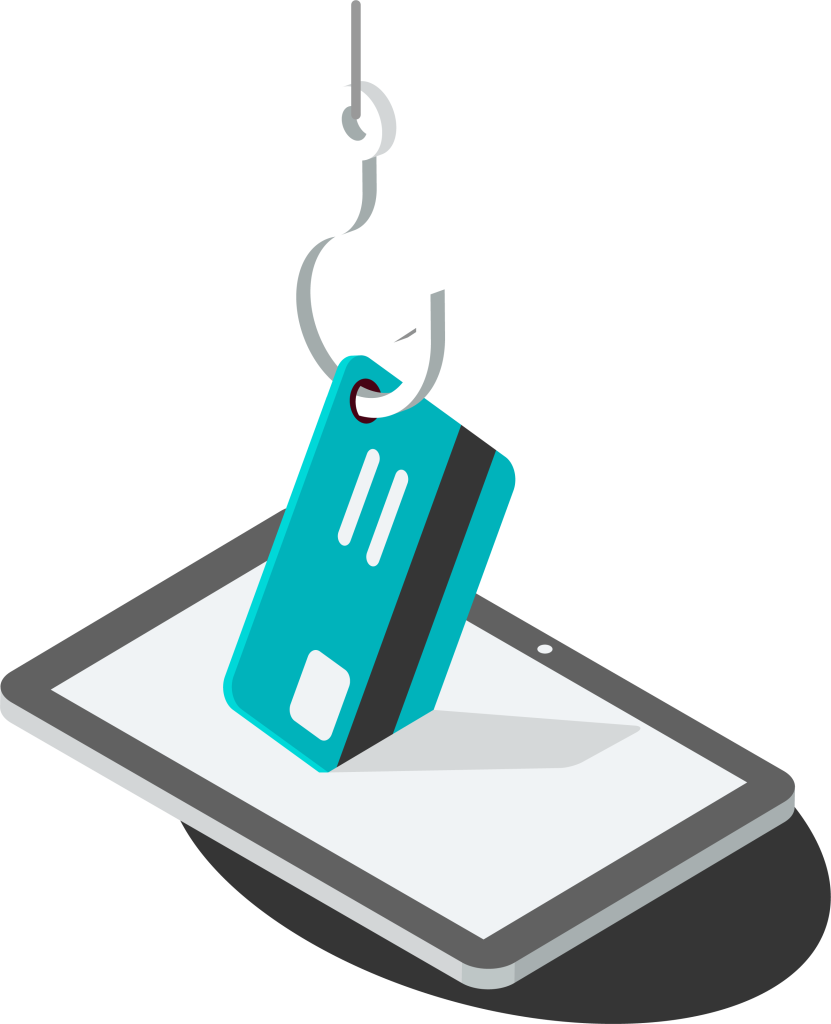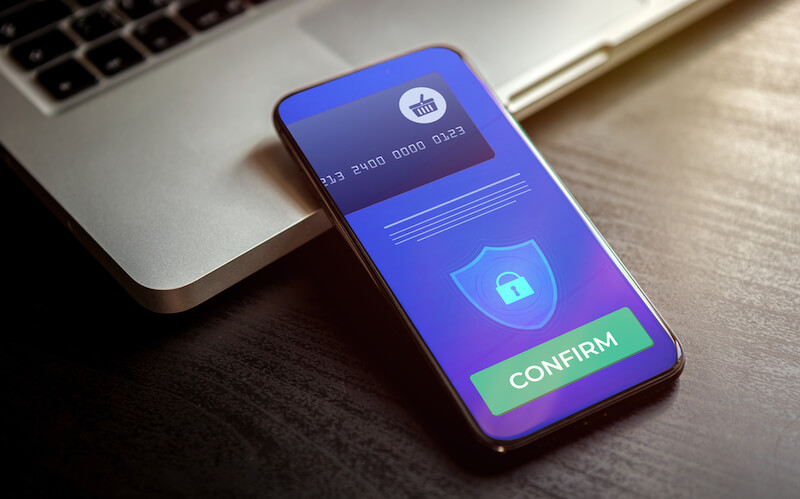
Contactless payment was introduced to make our lives more convenient. Unfortunately, as technology evolves and becomes more sophisticated, so do scams. Research has found that payment card fraud (which includes debit and credit cards) is one of the most common types of fraud in the UK, affecting around one in five people.
Scammers are constantly coming up with new and inventive ways to steal our money. This is why it’s so important to be aware of the latest credit card scams and recognise the signs before your money is taken.
If the worst does happen, your credit card company may be able to reimburse you. But considering the time and hassle that’s involved in getting the money back, it’s best to do everything you can to ensure you’re not a victim of credit card fraud in the first place.
With that in mind, we’ve written this article, which reveals five credit card scams to watch out for and lists some credit card fraud warning signs. With European Cybersecurity Month well underway, what better time to brush up on your credit card security knowledge? We will also give tips on how to protect yourself from credit card scams and explain what to do if you fall victim.
What credit card scams should I watch out for?
Card not present fraud (CNP) is a common type of fraud affecting credit and debit card owners. CNP happens when card and personal details are stolen and used to make fraudulent payments without the card owner’s consent. When payments are made online or over the phone, it’s harder for retailers to confirm that the person making the payment is the card’s true owner.
In Europe, CNP accounted for 79% of the total value of card fraud in 2018 and 76% in the UK in 2019. Fraudsters will often use phishing and skimming scams to gain card details to commit CNP. With phishing scams, you’re tricked into disclosing your credit card details. When it comes to skimming, scammers will use a device to steal your credit card details.
Your credit card details can also be stolen over an unsecured Wi-Fi network. You should also watch out for online shopping and charitable donation scams, where your information is obtained by false pretences.
Continue reading to find out more about these credit card scams and how they work.
Five credit card scams to watch out for
1. Phishing
Phishing is when a scammer contacts you via phone, email or text message and tricks you into disclosing your credit card details or other personal information.
In many cases, the scammer will pretend to be from a well-known company you already use and will be urgent in tone to get you to act quickly. For example, you might get an email from your “water supplier” saying that you need to update your payment details quickly; otherwise, your supply will be cut off. When you click on the link in the email, you will be taken to a clone of your supplier’s website, which looks the same but steals your credit card information.
These types of scams often target older people, who are more vulnerable because they tend to be less technologically savvy.
2. Skimming
In skimming scams, fraudsters attach devices to credit card readers and payment terminals, such as ATMs, in order to collect your credit card details. The scammers will then sell the information on or use it to make duplicate credit cards.
Credit card companies like Visa and Mastercard have tried to combat this by installing chips to prevent physical scans. However, skimming is still one of the most common methods of credit card fraud.
3. Online shopping
This credit card scam involves fake eCommerce websites, which look like legitimate online shops that ask you to enter your details to pay for items you never get.
While some websites will only accept payment methods like cryptocurrency or wire transfer (which are harder to reverse), the ones that do allow credit card payments are able to steal your credit card data.
These websites are often extremely convincing, featuring trademarks, professional imagery and the “https” lock symbol in the URL.
Another way fraudsters target online shoppers is by manipulating those who are looking for deals. Sometimes, this scam takes the form of an email that contains a bogus link, which, when clicked on, triggers a malware download for scammers to access your credit card details. Again, the email or text message will look professional and legitimate.
4. Unsecured Wi-Fi
Another common credit card scam is where fraudsters either monitor an unsecured public Wi-Fi network or create their own network to lure in members of the public.
When you try to connect to the network, you will be prompted to enter your credit card details to gain access, which the scammers will steal there and then, or your device will be infected with malware so hackers can access your data later.
5. Charitable donations
After a world disaster like a flood, a hurricane or a declaration of war, you might receive a phone call or an email from credit card scammers pretending to be from a charity like the Red Cross or the Salvation Army, asking for donations to support relief efforts. This is a particularly cruel scam because it tugs on people’s heartstrings and plays on the fact that they want to do something to help others in a time of crisis.
These types of scams are also presented in an urgent manner to get people to part with their money quickly before they’ve had time to consider the fact that it might not be a genuine appeal.
Credit card fraud warning signs
While it’s not always possible to identify a credit card scam, there are some red flags to look out for:
- Alerts from your bank — Be especially vigilant if your bank or credit card company has messaged you recently to warn you of new or increased credit card scams. They will also message you directly if they detect suspicious activity on your account. However, scammers will sometimes message people pretending to be their bank. If you’re at all suspicious, it’s important to remember that a legitimate bank will never call you up and ask for sensitive details like your PIN or password or ask you to move your money to another account.
- Suspicious activity on your account — Go through your credit card statements and take note of any charges or transactions you don’t recognise. Sometimes, fraudsters will take smaller payments before stealing larger sums. This particular type of scam is called ‘carding’.
- Unknown email addresses and phone numbers — If, for example, your “bank” emails you and asks you to click on a link, go through your previous correspondence to check that the email address is one they’ve used before. If you are unsure as to whether their contact details are legitimate, don’t reply to that email address. Instead, you should look up the company’s contact information and initiate an email or phone call yourself.
How to protect yourself from credit card scams
To reduce your risk of falling victim to credit card fraud, there are some measures you can take:
- Never click on links or download email attachments if something looks off or you don’t recognise the sender.
- Be wary of urgent calls or messages asking you to hand over your personal details.
- Look for signs of tampering or misuse when using ATMs or credit card readers — especially those that are unattended.
- Switch to contactless or mobile payments rather than using physical cards.
- Check your credit card statements regularly and notify your credit card issuer if something doesn’t look right.
- Set up alerts on your credit card accounts, so you’re notified of a purchase you didn’t make straight away.
- Check your credit report for any credit card or loan applications you didn’t make.
- Avoid using Wi-Fi networks with names like “Free Public Wi-Fi”.
- Never enter your credit card details to gain access to an unsecured Wi-Fi network.
- When using public Wi-Fi, avoid online banking and online shopping.
- Install antivirus software on all your devices and install a VPN if you regularly use public internet.
- If you’re contacted by a charity asking for help, research the cause before you donate any funds.
- If you receive a call from a suspicious phone number, search the number online by putting quotation marks around it to see whether it has been identified as a scam caller.
- Avoid answering calls from “Unknown” or “No Caller ID” numbers.
- Set up multi-factor authentication to secure your credit accounts.
You can also protect yourself from credit card scammers by using a virtual prepaid card instead of a regular credit card. When paying online using a Getsby virtual card, your personal payment details remain protected.
These cards have an extra layer of security, thanks to Mastercard 3D Secure and tokenization, which converts your card number into a Token ID so fraudsters can’t access it. And for even more security and peace of mind, you can even use a disposable prepaid card to make a one-time purchase.
What to do if you fall victim to credit card fraud
 If you are the victim of a credit card scam, it’s important not to blame yourself. These scams can be incredibly sophisticated and well-organised and often involve teams of people. And remember that you won’t have been the only person to have been taken in.
If you are the victim of a credit card scam, it’s important not to blame yourself. These scams can be incredibly sophisticated and well-organised and often involve teams of people. And remember that you won’t have been the only person to have been taken in.
You’ll also be relieved to know that there are some ways you can take control of the situation. You can be proactive about trying to get your money back and holding these criminals to account by doing the following:
- The first thing to do is to speak to your credit card issuer and — if they are not already aware — let them know you are a victim of fraud. Most financial institutions will have a dedicated fraud team who are specially trained to deal with these types of scams and will be able to offer you assistance.
- Report the scam to the three major credit bureaus (Equifax, Experian and TransUnion in the UK) so that the fraudulent activity doesn’t show up on your credit report and damage your credit score.
- Report the scam to Action Fraud, which is the UK’s national reporting centre for fraud, or the police.
- Change all of your passwords as soon as you become aware of the fraudulent activity.
Summary: Credit card fraud — scams to watch out for
One of the most common credit card scams is Card Not Present Fraud (CNP). Scammers often use tactics like phishing, where you’re tricked into disclosing your credit card details and skimming, when scammers use a device to steal your credit card details to commit CNP. Your credit card details can also be stolen over an unsecured Wi-Fi network, and you should also watch out for online shopping and charity scams, where your information is obtained by false pretences.
These scams are often incredibly sophisticated and well-organised, with teams of people involved. This means it’s not always possible to identify a credit card scam. However, there are some red flags which could indicate there might be something untoward going on. These include alerts from credit card issuers warning you of new or increased scams, suspicious activity on your credit card account and being contacted by unknown email addresses and phone numbers.
To reduce your risk of fraud, you should never click on links or download email attachments, check your credit card statements for suspicious activity and avoid answering calls from unknown numbers. If, however, you do become a victim of fraud, you should speak to your card issuer, report the scam to the authorities and change your login details.
Order your Virtual Card today



